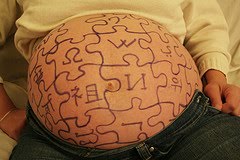
"Romantic deception is the unrestrained misrepresentation of significant facts in the context of an intimate relationship."
- Sally Caldwell
My Wikipedia might not be your Wikipedia. So I am disclosing upfront that I'm reporting here in the second-person. No investment of mine has been helped or hurt by my pondering 15 immortalizing minutes in some future wiki entry. I have never lifted an editorial finger. I have won no prizes and I have entered no drawings.
But I have contemplated the definitive boundaries that pass for flag-planting on the territorial vapors of intellectual capital. All of us in our own way are traipsing soiled footprints across the ash heap of post copyright history.
But I have contemplated the definitive boundaries that pass for flag-planting on the territorial vapors of intellectual capital. All of us in our own way are traipsing soiled footprints across the ash heap of post copyright history.
Wikipedia is a self-selected guild of fact-selectors. Wikipedia is a tease. We fancy an all-volunteer brigade of scribes banding together to preserve text-based civilization against the backdrop of the cave paintings of a new millennium. In actuality those scribbles only pass for recordings after they've had all passion drained from their inspirations. A personality-blocker is the bouncer at the back door of the Wikoteque. All music must have stopped by the time those recordings hit the wiki stage. All secret handshakes have had their locks changed by the time the stench of impropriety is removed from the surface of the choppier editing channels.
As mentioned I have not stepped forward to claim, alter, deny, or crow about any contestable, explosive, or simmering interpretations referencible to my clouds and stars. I'm aroused around Wikipedia's merits as official scorekeeper of recorded history -- society's C drive of shared experience. But it's the misguided attempts at governance that lock in my fascination. "Do no self-promotion" is their Google mission-like equivalent to abstaining from evil. They are the counterpart to the wages of exposure. They are faceless book. And their book is far from open.
Do No Originality Unto Others
How does one exactly flunk their Wikipedia auditions? One wiki editor pulled rank on one of my college pals over the appearance of original research tucked within the recessed annals of Beatles history. Judging by the concentrations of the wiki Beatles history review board, me thinks Jimm would have had an easier time sneaking a 12 story litter box low rise past the NYC Landmarks Commission than footnoting a single moment in Lennon's life on Wikipedia.
Do No Originality Unto Others
How does one exactly flunk their Wikipedia auditions? One wiki editor pulled rank on one of my college pals over the appearance of original research tucked within the recessed annals of Beatles history. Judging by the concentrations of the wiki Beatles history review board, me thinks Jimm would have had an easier time sneaking a 12 story litter box low rise past the NYC Landmarks Commission than footnoting a single moment in Lennon's life on Wikipedia.
The second instance involves a former student Darlene Adams who is now partnering with Sally Caldwell, a professor at the University of Texas, to publish a book and survival guide addressing Romantic Deception. She tried to post the definition and was promptly struck down by an administrator for "advertising." Despite a credible reference (to the book's first edition published in 1995), they dismissed the follow-up on the grounds it is self-published. Another non-no: only one attributable reference to the entry in question (not that this blogging entry counts as two...)
Man, talk about perpetuating the myth that publishing is the exclusive domain of standalone publishing houses. Just how big a house? According to Darlene they wanted an "encyclopedic reference." There's even a time stamp with an expiration date. That's the deletion-facing deadline for having your substantiations in the proper order. Translation: proof that an article is not "advertising for the book cited in the source."
Sounds like the cart before the horse but not the driver. Those wiki patrollers may say and truly believe that they're maintaining roads and bridges. But they're also the road agents. And the horses stand a greater chance of passing through than we do.
Sounds like the cart before the horse but not the driver. Those wiki patrollers may say and truly believe that they're maintaining roads and bridges. But they're also the road agents. And the horses stand a greater chance of passing through than we do.


2 comments:
Bravo!
Darlene -- It sounds like there is a presumption of credit-taking that goes into every alert. Perhaps the hypothesis is that all postings are self-promotional until proven otherwise?
Post a Comment